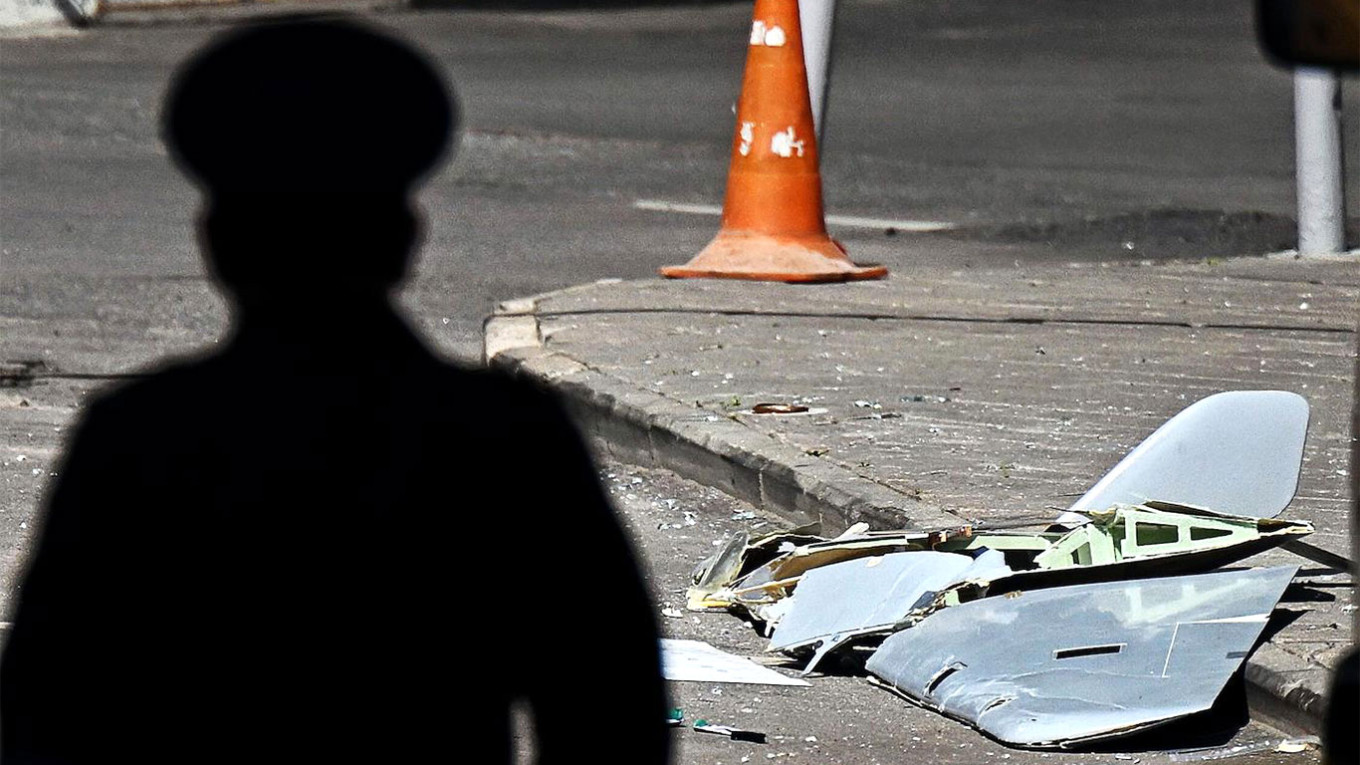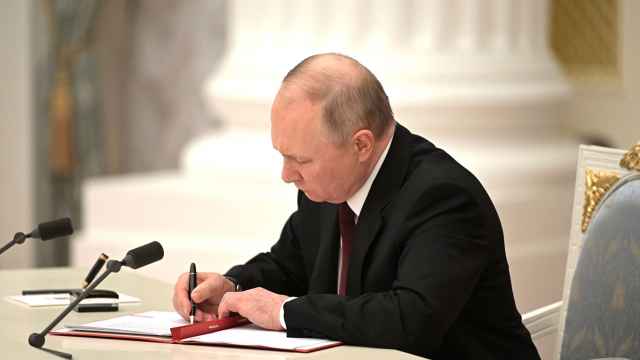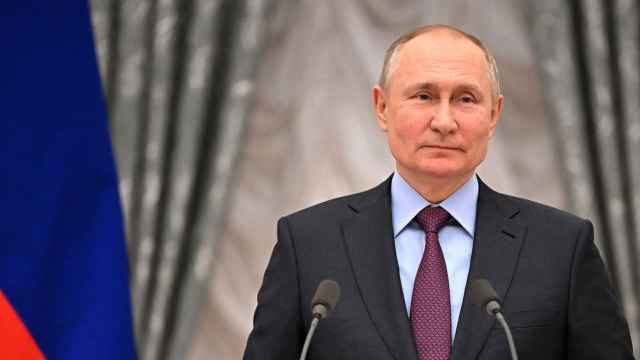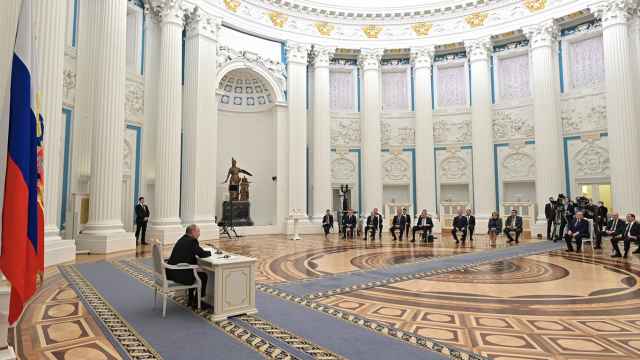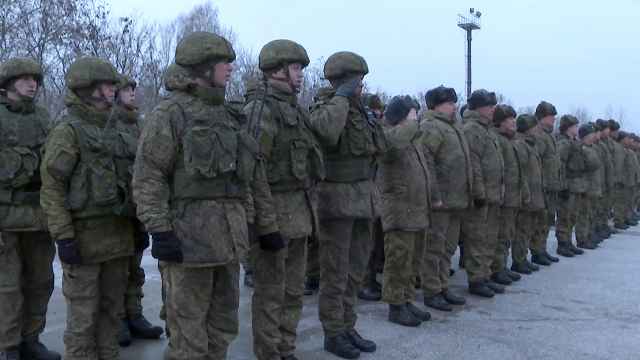The Russian government’s reaction (or lack of) to what appear to be Ukraine’s increasingly audacious attacks on Russian territory is extraordinary. In addition to the repeated shelling of border regions, last week paramilitaries launched a cross-border raid of the Belgorod region, and now Moscow itself is under attack from drones. Yet none of this apparently warrants a public response.
President Vladimir Putin is silent as usual; his spokesperson refers all questions to the Defense Ministry; and the Defense Ministry responds with endless reports of its successes that everyone stopped believing long ago. The overall impression is that the Russian leadership does not fundamentally understand the danger the country is in right now.
It’s interesting to observe how the Russian authorities’ explanations of their defeats have evolved over the last fifteen months of war. Until about the end of last summer, the most popular refrain was to quote Putin from his July 7 meeting with parliamentarians: “We are only getting started.” Back then it seemed like the Kremlin knew what it was doing, that it still had some aces up its sleeve.
At the same time, there was a lot of talk about red lines, which if crossed would result in merciless and devastating retribution. But then came a seemingly endless stream of bad news: the assassination of the pro-war journalist (and daughter of the far-right political philosopher Alexander Dugin) Daria Dugina, the retreat from Ukraine’s Kharkiv region, the attack on the bridge linking Russia to Crimea, the withdrawal from the city of Kherson, the deadly missile strike on the temporary Russian military base in Makiivka, and so on.
Within a few months, it seemed that the Kremlin’s red lines had either never existed or had become extremely mobile. The reaction of the authorities was more or less the same every time: downplay the significance of the event, present Russia as the victim, and depoliticize the problem — all without any public involvement from Putin.
Perhaps all of this would have remained inconsequential if the attacks were not becoming increasingly bold. Paramilitaries entering the Belgorod region on armored vehicles and drone attacks in prestigious Moscow suburbs are a whole new level of danger: a physical threat to the general public. The seriousness of these attacks is entirely at odds with the apathetic reaction of the government, which, no matter what, continues to behave as if nothing is happening.
Moscow Mayor Sergei Sobyanin talks about “minor damage”; Putin’s spokesman Dmitry Peskov praises the Russian army (“Everything worked as it should”); and the Investigative Committee routinely opens new criminal cases. On the same day as the latest drone attacks on Moscow, Defense Minister Sergei Shoigu’s comments during a conference call with journalists were striking for their self-congratulatory content.
This is how the Russian system works: all of its resources are concentrated not on repelling attacks or assessing the level of danger, but on shirking responsibility as much as possible. Peskov is forced to transmit Putin’s imperturbability, even if it flies in the face of common sense. The mantra “Don’t make a big deal of it” is another way of trying to avoid irritating the president.
Even as Russian media is awash with reports of drones damaging civilian infrastructure, injuring people, and necessitating evacuations, the Defense Ministry simply reports how many drones it has downed or intercepted. State Duma Deputy Andrei Gurulyov’s proposed solution is to make it illegal to take photos and video footage of drones: no evidence, no problem.
Putin himself did not make any public comments on the drone attacks until the afternoon, and even then, his reaction was predictably routine: this was an attempt by Ukraine to frighten people; it was terrorist activity, but “the air defenses had worked satisfactorily.” When asked during his morning briefing with journalists about the president’s plans for the day, Peskov had replied: “Economic issues and talking with entrepreneurs, with a focus on architecture, urbanism, education, and other areas of the creative economy.”
In other words, there is no understanding of the scale of what is happening, or any empathy for ordinary Russians, including those caught up in the attacks. Instead, the message was clear: the president is hard at work, and the Kremlin does not consider the attacks an emergency.
On more than one occasion, Putin has spoken of the outstanding endurance of the Russian people, their resilience and understanding of the government’s decisions and solidarity with those decisions. This is apparently the guiding principle of the president’s interaction with society. No matter how daring the next attack might be, Putin doesn’t believe it could spark anger in Russian society with the authorities.
What he does fear is alarmism, because if the public sense of danger becomes too strong, the authorities will have to mobilize resources to respond — and that doesn’t fit into the Kremlin’s chosen tactic of biding its time. Better, therefore, to keep quiet where possible, to present failures as successes, and to not dwell on the attacks: then there will be no need to react or make excuses. In his dealings with domestic institutions and the elite, Putin has long been guided by the same mantra of “Don’t make a big deal of it.”
In the parallel world of “ultrapatriots” and gung-ho military bloggers, however, “Don’t make a big deal of it” looks suspiciously like helplessness and ineptness. Even Russian television, while minimizing coverage of the attacks, cannot help but continue to rile up the public by talking about the ever-growing external military threat.
There are three main reasons for the government’s passive reaction to the drone attacks: Putin’s faith in people’s endurance, the authorities’ fixation on demonstrating their “successes,” and Russia’s objective lack of military preparedness to respond effectively to such attacks. In the Russian system, the first person to raise the alarm gets the blame: it’s easier to hush everything up than to admit vulnerability. But the problem with this tactic is that it has its limits. People want to see strong leadership, but right now, that leadership is looking increasingly helpless and confused.
This article was originally published by The Carnegie Endowment for International Peace.
A Message from The Moscow Times:
Dear readers,
We are facing unprecedented challenges. Russia's Prosecutor General's Office has designated The Moscow Times as an "undesirable" organization, criminalizing our work and putting our staff at risk of prosecution. This follows our earlier unjust labeling as a "foreign agent."
These actions are direct attempts to silence independent journalism in Russia. The authorities claim our work "discredits the decisions of the Russian leadership." We see things differently: we strive to provide accurate, unbiased reporting on Russia.
We, the journalists of The Moscow Times, refuse to be silenced. But to continue our work, we need your help.
Your support, no matter how small, makes a world of difference. If you can, please support us monthly starting from just $2. It's quick to set up, and every contribution makes a significant impact.
By supporting The Moscow Times, you're defending open, independent journalism in the face of repression. Thank you for standing with us.
Remind me later.



